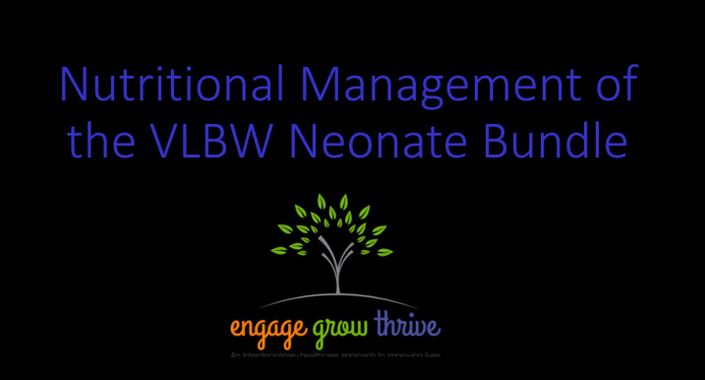
Nutritional Management of the VLBW Neonate Bundle
Nutritional support of the preterm neonate is a foundational concept in optimizing long term outcomes. In this comprehensive nutritional management bundle, presentations include:
- Prevention of Malnutrition & Growth Failure: Includes the definition of malnutrition or growth failure and strategies to reduce this significant and unfortunately common morbidity in the preterm neonate. The presentation encourages taking a proactive approach to optimize nutrition and growth.
- Parenteral and Enteral Nutrition: This presentation discusses strategies to optimize specific nutrient components of both parenteral and enteral nutrition to provide for appropriate growth.
- Nutrition Monitoring and Discharge Nutrition: This presentation suggests strategies for consistent practices to assess growth and provides recommendations for ensuring continued optimization of nutrition and growth after discharge from the NICU.
- Benefits of Human Milk: Human milk is one of the most beneficial and most natural therapies we can provide preterm neonates in the NICU. This presentation includes a discussion of the benefits of human milk, including the differences between mother’s own milk and donor human milk and strategies to support mother’s lactation with examples of successful QI implementation.
- Pre-Feeding Interventions: Extreme preterm neonates endure prolonged periods of absent positive experiences coupled with severely negative and painful procedures in their life that impact their desire and ability to feed orally. This lecture will focus on activities and interventions that can prepare the infant and help to build the foundational skills for positive, successful, and enjoyable oral feeding.
- Necrotizing Enterocolitis (NEC) is one of the most devastating complications seen in the preterm infant in the NICU. It significantly increases the risk of death and/or significant long term neurodevelopmental sequelae. This presentation describes risk factors for preterm bowel injury, the mechanisms of NEC, the clinical features, and recommendations for the prevention, diagnosis, and management of NEC.
Objectives:
1. Describe two evidence-based nutritional interventions to prevent post-natal growth failure.
2. Identify one long-term risk associated with growth failure.
3. Describe one evidence-based parenteral nutrition and one enteral nutrition intervention to prevent post-natal growth failure/malnutrition.
4. Identify one benefit provided by newer lipid emulsions to the premature infant.
5. Name one component in maternal breastmilk that helps to facilitate growth.
6. Describe two clinical methods to monitor growth in the premature infant.
7. Identify two factors that put the VLBW infant at risk for neonatal malnutrition.
8. Describe one nutrition goal for the VLBW infant at discharge.
9. Identify one nutrition intervention used for a high risk VLBW infant leaving the NICU.
10. List three benefits of a human milk diet.
11. State two benefits of Mother's own milk.
12. Identify two strategies to support lactogenesis.
13. Discuss two ways an infant is developing feeding skills in utero.
14. Identify three neonatal experiences in the NICU that can negatively affect the premature infant's future feeding skills.
15. Describe three pre-feeding techniques to facilitate the foundation for positive oral feeding skills.
16. Describe three risk factors for the development of NEC in the small baby.
17. Discuss two complications associated with NEC.
18. Identify three best practice important in reducing the incidence of NEC.
19. Describe two challenges in defining what NEC is due to its complex pathogenesis.
20. List two possible and potential ways to predict or make the diagnosis for NEC when it occurs.
21. Define two current management approaches to minimizing harm when NEC develops.
22. Describe two long-term consequences of NEC.
Total CE = 7.7
NCC Code NNP 1, 2, 3, or 7
NCC Code NIC 1, 2, 3, or 7
NCC Code LRN 2, 3, or 7
Rx = 1
*These presentations were included in the Small Baby Care Specialist® Program
Last updated: November, 2021
Your Instructor

The faculty for the Nutritional Management of the VLBW Neonate Bundle truly exemplifies the interdisciplinary team involvement necessary for improving nutritional outcomes in the preterm neonates.
Jae Kim is a neonatologist and gastroenterologist with an extensive background in neonatal nutrition.
Christine Bixby is a neonatologist and International Board Certified Lactation Consultant.
Karin Mitchell is a speech language pathologist certified as a neonatal therapist and in lactation education. She specializes in the care and treatment of pediatric feeding and swallowing.
Mindy Morris is a neonatal advance practice nurse with a passion and expertise in the nutritional care of the ELBW neonate.
Gina O’Toole is a neonatal dietitian and lactation educator focusing her efforts on the importance of breast milk for the high-risk neonate.